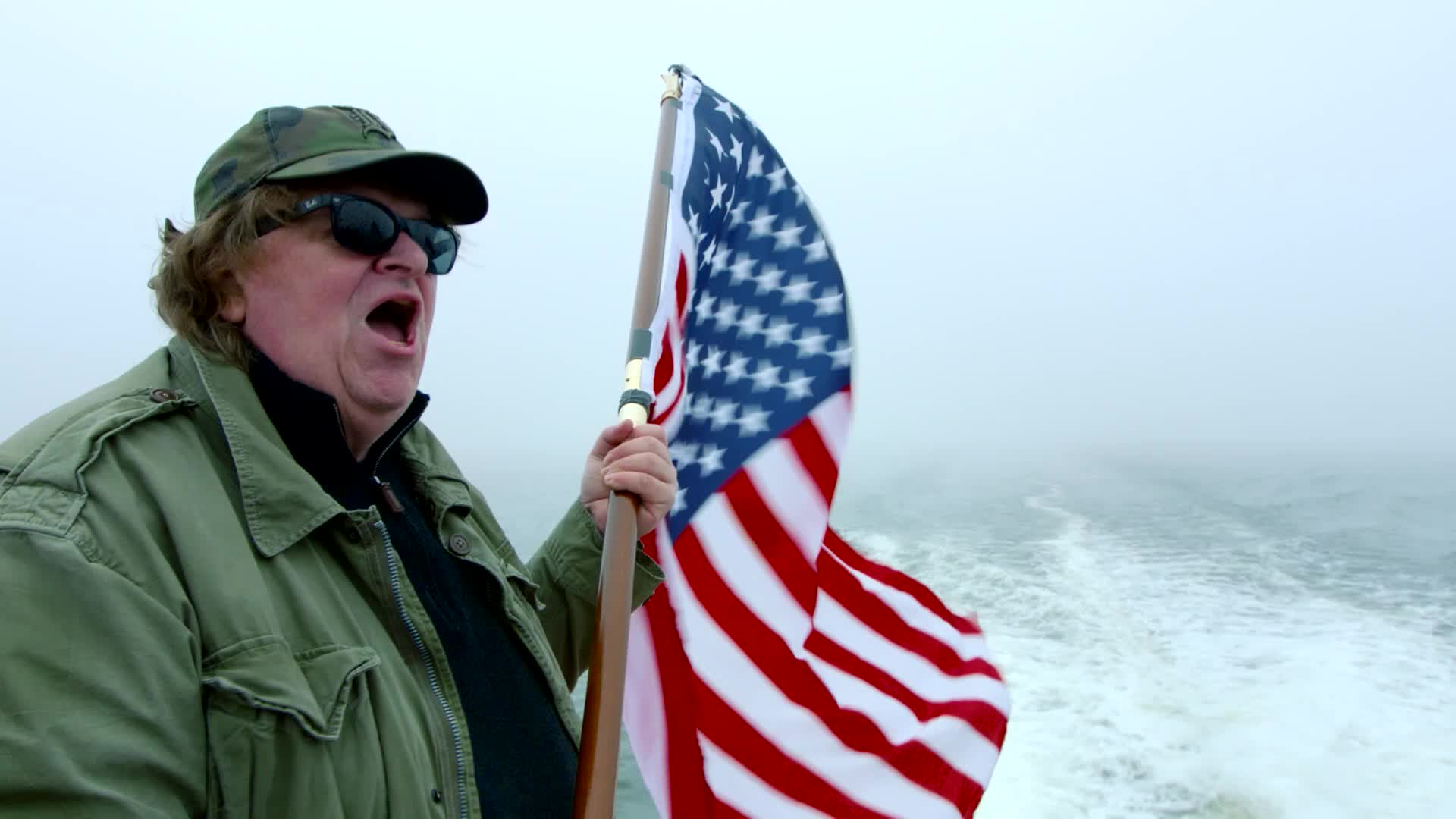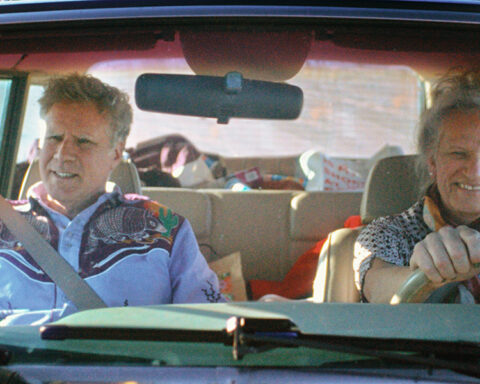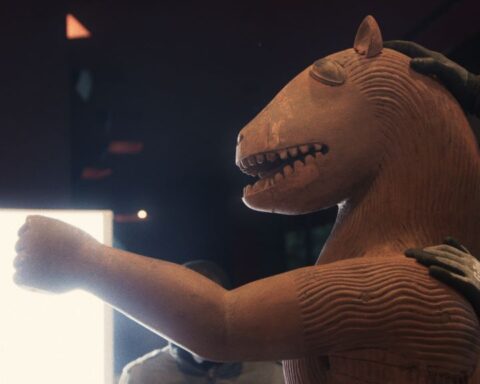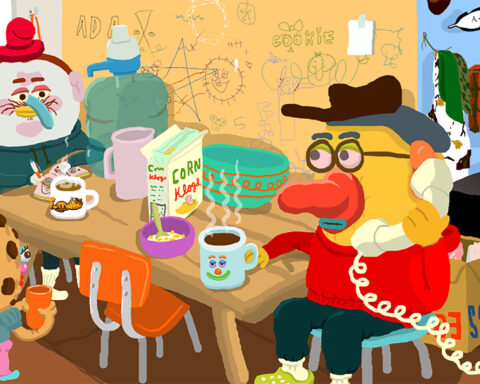Life is funny in a million ways. We joke at work, at meals, in bed, to relieve stress, dispel sadness, mock our enemies and cheer our friends. Humour exists in every culture, every era. Yet, with a few exceptions, documentary films, which aim to reflect life, often leave the spice of life out of the recipe.
One explanation may be that documentary films have a more important job to do than amuse us. They present stories or arguments about the real world that we believe to be truthful; expose hypocrisy, the horrors of war, genocide, abuse; inspire, advocate or celebrate. We can all think of the exceptions: the first-person comic essays of Ross McElwee, Michael Moore or Morgan Spurlock, the sardonic edge of Errol Morris or Werner Herzog, the light touch of Ron Mann’s pop cultural studies, the stoner classics like The Atomic Cafe and Cane Toads, but, as a genre, the documentary usually varies in tone between the sermon and the pep rally.
Humour, which can be defined as the pleasure we feel from perceived incongruity, is a volatile element. John Updike identified the problem in a line from Rabbit, Run: “The difficulty with humorists is that they will mix what they believe with what they don’t—whichever seems likelier to win an effect.” Being funny has no conscience. As English philosopher Herbert Spencer wrote in his 1875 essay, “On the Physiology of Laughter,” comedy “demands something like a momentary anesthesia of the heart.”
Yet I can think of at least three reasons why almost all documentaries would be improved by being funnier. First, the moment is right. Second, you can’t take reality that seriously, and third, humour is far too important to be left to the entertainment business.
1. The moment is right
Timely? Really? On the face of it, the comic documentary is a genre in search of examples. For big-budget non-fiction comedy, you’re probably left with the Jackass movies and those occasionally brilliantly comic sequences in Sacha Baron Cohen’s Borat and Bruno. Still, it’s a situation the documentary world seems to want to change. There was a recent panel at the New York Women in Film and Television festival in early May, optimistically titled ‘Funny Docs!—A Hilarious Panel.’ In March, the more sober Cinéma du Réel festival in Paris offered a debate on the subject “Humour in documentary.” As in, yea or nay?
Michael Moore, who has at various times claimed to dislike the documentary label, has simply billed his most recent film Where to Invade Next as his “new comedy.”
One reason for this heightened interest in comedy, I think, is that documentaries are harder to take as seriously as we used to take them. The idea that the photographic image holds a special residue of reality has been undermined by digital recording. When everyone has a motion picture camera in his or her pocket, the processes of recording and staging events with a camera have become demystified. Hybrid genres of staged fiction and recorded reality, from international-art-festival auteur films to reality television to stunt comedy, have proliferated in the new millennium.
One area that has been under-appreciated is how modern comedy, of the post-Second City and Beyond the Fringe era, grew from the same post-War impulses of immediacy and improvisation that gave us cinema verité. From the late 70s and early 80s, we’ve seen a proliferation of mockumentaries, kicked off by Albert Brooks’ Real Life (1979) and This is Spinal Tap (1984). Such sitcoms as The Office, Veep, Parks and Recreation, Trailer Park Boys and Modern Family use the mockumentary frame because it’s inherently funny to have shaky cameras and people directly speaking to the lens. Steve Levitan, the co-creator of Modern Family, considered having a fictional director in the show but rejected it because “I don’t like those families who let cameras in their houses in real life.”
The culmination of the mock-doc trend is the new Netflix-IFC comedy series Documentary Now!, a parody of an earnest public-television TV documentary showcase featuring Saturday Night Live alumnae Fred Armisen, Bill Hader and Seth Meyers. Last summer’s introductory season (there are two more seasons in the works) spoofed Albert and David Maysles’ Grey Gardens, Errol Morris’s The Thin Blue Line, and Robert Flaherty’s Nanook of the North, among other documentaries. More funny-peculiar than funny-ha-ha, the series assumes a familiarity with both the films and. in some cases (Nanook episode), their controversial back stories. A couple of critics have used the phrase from computer animation, “uncanny valley,” to describe Documentary Now!’s melding of homage and parody.
Like the Christopher Guest folk music parody A Mighty Wind, Documentary Now! lampoons the artifice of authenticity, the Baby Boomer generation’s self-important idealism and the contrivance of staring into either end of the camera lens and pretending that this is “reality.”
2. People take reality too seriously
As film philosopher Noel Carroll complained in an interview in the journal Senses of Cinema, filmmakers have a bad tendency to try to ponder above their metaphorical wage scale. “Why do film people have to make commitments as regards metaphysics and the nature of identity? Of all the claims they have to evaluate, these are the ones they are least suited for.”
Fortunately, the people who are best suited to answer these questions, philosophers and scientists, have reached a consensus on this subject: Whatever reality is, it’s not what you think.
Try to prove you’re not a brain in a vat, goes one philosophical mind game. Another is that memory could be an illusion. “There is no logical impossibility in the hypothesis that the world sprang into being five minutes ago, exactly as it then was, with a population that ‘remembered’ a wholly unreal past,” Bertrand Russell wrote in 1921. Or maybe that was just a minute ago.
Last fall, NASA scientist Rich Terrile gave his support to the theory that we’re probably living in a hologram created by an alien computer programmer, which explains why we’re gaining knowledge so fast.
If the latter case is true, it’s in our interest to do everything in our power to amuse the alien programmer with funnier documentaries to keep its itchy tentacle off the delete button as long as possible.
3. Humour is too important to be left to the entertainment industry
As a way of cutting through the information clutter, helping us grasp ambiguity and demonstrating trust-worthiness, humour can make the difference between a merely worthy documentary and a great one.
We’ve heard a lot about how the millennial generation prefers spoof news of The Daily Show and The Colbert Report ilk to real news. In fact, according to the prestigious Pew Research Center (Public Knowledge of Current Events Little Changed by News and Information Revolutions: What Americans Know 1989-2007) they also tend to be better informed and to retain information about current events better than those who got their news from newspapers or other television stations. The absurdities become the hook that brings along the rest of the information. Possibly better informed people enjoy satire or perhaps the humour is a hook that carries the rest of the information to them.
In recalling Mark Lewis’s Cane Toads (1988), I think of a little German girl dressing up a plate-sized poisonous toad like a doll and calling it Dairy Queen. After that masterly comic coup, the rest of the film is a bonus. In fact, Lewis’s comic attitude throughout Cane Toads makes it so memorable that viewers actually return to watch what is actually a film about an infestation of oversexed, predatory and destructive amphibians, which reflects humanity’s lack of harmony with nature.
The second reason humour is too important to be left to entertainers is that it helps clear the mental sludge. Considered as an evolutionary tool, humour helps us bond with others, exchange information and see where hypocrisy lies. To quote Noel Carroll again (from his book, Humour: A Very Short Introduction): “Comic amusement erupts in the process of discerning the way the cognition/emotive system has misfired. Or to change metaphors, it is part and parcel of cognitive cleansing process we undergo—which process is stoked by pleasure.”
Humour inoculates us against the effects of self-righteousness and sentimentality. The late Canadian documentarian Allan King once told me in an interview that he relied on Ernest Hemingway’s rule for good writing: relying on his built-in “bull-shit detector” to avoid sentimentality and emotional cliché. Staying tuned to the ridiculous is a way of making sure the detector is charged.
When he made the keynote address at the 2014 Toronto International Film Festival’s Doc Conference, Michael Moore told the audience, “When I had my TV show, on the first day in the writers’ room I said, ‘Let’s write down the list of all the things that you’re not supposed to be funny about, and then we’re going to do stories that use humour to say the things we want to say about each of those issues.’ So we made a list: the Holocaust, AIDS, child abuse…”
As noted earlier, humour, the pleasure in the perception of the incongruous, has no conscience, but through the comic “momentary anesthesia of the heart” we can contemplate the juxtaposition of grotesquely different ideas. Think of Joshua Oppenheimer’s The Act of Killing (2012), in which the filmmaker confronts the mass murders in Indonesia in 1965-1966. There’s a scene with a former death squad member, dressed in drag, who sings a song in front of a fish. As Oppenheimer explained to interviewer Joshua Sperling: “I think we’re laughing because he’s so open. Here is a fat, obviously heterosexual gangster in a dress, singing us a song. And it’s so generous of him.”
We often hear that real life, unlike drama, isn’t black or white. More accurately, it’s often black and white in successive moments—like the joke about the nun rolling down the hill. To put it another way, the most lifelike literary genre is tragicomedy, and documentary film can only be more credible by acknowledging our simultaneous wayward impulses.
Above all, there’s the question of trust. Why should we take anyone seriously who is afraid to reveal a sense of humour? The critic Mark Van Doren summed up this idea in an essay on Thomas Mann’s Joseph and his Brothers: A Comedy in Four Parts: “Nothing in man is more serious than his sense of humour; it is the sign that he wants all the truth, and sees more sides of it than can be soberly and systematically stated; it is the sign, furthermore, that he can remember one idea even while he entertains another, and that he can live with contradiction. It is the reason, at any rate, why we can never take seriously the one whose mind and heart have never been known to smile.”













